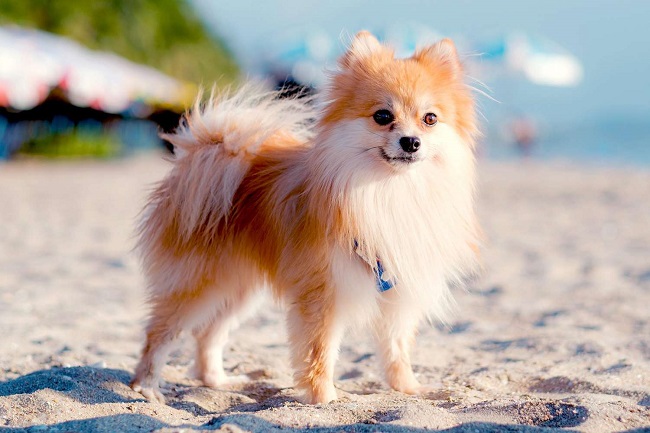In the realm of designer Dogs, one breed that captures hearts worldwide is the ‘Pomchi’. A delightful blend of the Pomeranian and Chihuahua, the Pomchi boasts the best of both worlds, making it a charming and loveable pet.
This article provides an in-depth look into the Pomchi, uncovering everything you need to know about this enchanting hybrid.

Overview: The Pomchi (Pomeranian & Chihuahua Mix)
Before diving into the specifics, let’s explore some basic facts about this delightful hybrid:
Breed Origin
The Pomchi, a cross between the Pomeranian and Chihuahua, originated in the United States around the 1990s during the boom of designer Dog breeds.
Size
Being a mix of two small breeds, the Pomchi typically weighs between 5 to 12 pounds and stands around 6 to 9 inches tall.
Lifespan
With proper care and a healthy lifestyle, Pomchis can live between 12 to 15 years, sometimes even longer.
Coat
Pomchis often inherit a medium to long length coat that can be straight or slightly wavy, with a variety of possible colors inherited from their parent breeds.
Understanding the Pomchi: Key Traits & Personality
The ‘Pomchi’ carries an intriguing mix of traits from both its parent breeds. Let’s delve into their defining characteristics:
Temperament
Pomchis are known for their lively, affectionate, and somewhat mischievous personality. They adore human interaction and thrive when included in family activities.
Intelligence
The Pomchi, with its Pomeranian parentage, often displays a high level of intelligence. They’re quick to learn but can be a bit stubborn at times.
Energy Levels
Despite their small size, Pomchis are energetic Dogs who love playtime. Daily walks and regular play sessions will keep them happy and healthy.
Adaptability
Their compact size makes them adaptable to various living conditions, from apartments to houses, as long as they’re given ample attention and stimulation.
Caring for Your Pomchi: Health, Diet, & Exercise Needs
Being a Pomchi parent requires understanding their specific care needs:
Health
While generally a healthy breed, Pomchis can be predisposed to certain health conditions like dental problems, heart issues, and patellar luxation.
Diet
A well-balanced diet suited to their size, age, and activity level is key. High-quality commercial Dog food or home-prepared meals under vet supervision work well.
Exercise
Pomchis are sprightly Dogs that need regular exercise to keep them physically fit and mentally stimulated. Daily walks, playtime, and puzzle toys can help fulfill their activity requirements.
Training Your Pomchi: Effective Strategies
Training a ‘Pomchi’ can be a rewarding experience, thanks to their intelligent and lively nature. However, their sometimes stubborn side may pose a bit of a challenge. Here are some strategies to ensure successful training:
Positive Reinforcement
Just like their parent breeds, Pomchis respond best to positive reinforcement techniques. Rewards like treats, praises, or petting can effectively encourage desired behaviors.
Early Socialization
Start socializing your Pomchi at a young age to ensure they grow into well-adjusted, sociable adults. Exposure to different environments, people, and other pets can help them become more comfortable and confident.
Consistent Training
Be consistent in your training commands and routines. Consistency helps your Pomchi understand what is expected of them and reinforces learned behaviors.
Patience and Persistence
Finally, remember that patience is key. Training takes time, and your Pomchi may take a while to fully grasp new commands or behaviors. Don’t get discouraged; persistent training will eventually pay off.
Conclusion
Embracing a blend of charm, intelligence, and liveliness, the ‘Pomchi’ makes a delightful companion for those who appreciate the perks of small Dogs.
Caring for a Pomchi requires commitment, but the joy and companionship they offer in return make it all worthwhile.
If you’re searching for a small, loving, and energetic Dog, the Pomchi could be the perfect choice for you.
























